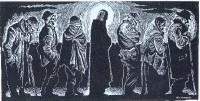

Karen House Catholic Worker
 |
Karen House Catholic Worker |
The RoundTable Humor Spring/Summer 1986
Major Articles
|
Download Entire Issue by Clicking Image Above (large file - takes a minute!) |
|||
Karen House: 1840 Hogan St. Saint Louis, MO 63106 Contact Us: 314.621.4052 |
Regular Features
|
Why This Issue: We've all heard the saying so many times before that it flirts with banality. Still, I will repeat it: It takes fewer facial muscles to laugh than to frown. A smile does indeed feel more natural and intrinsically human than a frown. It is also more invitational, suggesting sharing and bonded-ness. Upon hearing or seeing something humorous, who, among us can wait to relay the incident to a friend? Think how often you've walked into a room, only to blurt out the question: "What's so funny?” anxious to be brought into the circle of celebration, to be let in on the joke. Jokes, after all, are meant to be shared.
We wish to share some humor with you, in this our combined spring/summer number. This issue was longer in gestation than most, throwing us off our quarterly schedule. In addition, our coffers are abnormally low just now. Not without some reluctance, we thought it best to combine issues this time around, saving both time and money.
In a book entitled Laughter and the Sense of Humor, Edmund Bergler maintains that there are eighty different theories about the nature and origin of humor. (Even without having met him, I've already ungraciously determined that Mr. Bergler must be a decidedly humorless man himself, what to have researched and catalogued over eighty such theories!)
The nature and origin of much of the humor in these pages, however, lies in the interplay between the human spirit continuing to groan for freedom and justice in the face of what seem to be insurmountable odds. This is the humor of paradox, a type of humor both Belden Lane and Ellen Rehg comment on in their respective articles. Belden also offers us a theology of laughter, while Ellen brings us behind the scenes, relating our struggles in pulling this issue together.
That same interplay is why we have poked fun at ourselves in parts of what follow. Indeed, one of the motivations for this issue was to insure we don't take ourselves too seriously, as we suspect most of our readers wouldn't if you got to know our communities intimately! And so we laugh at ourselves, at our feeble, halting, and sin-ridden attempts to slay Goliath -the system which keeps our guests mired in poverty and powerlessness.
The original cartoons of Chuck Trapkus of the Rock Island, IL Catholic Worker, and Emmett McAuliffe's satire of the simple lifestyle ethic all strike close to home. We have cast our satirical net a bit more broadly though, even managing to ensnare Ronald Reagan and his Central American policies in it, a not too, difficult feat actually. After having been fed a steady diet of state falsehoods regarding Central America by the mainline media for so long now, satire is one way to keep our wits and blunt the human tragedy of U.S. policy.
Though I know of no instance where our co-founder, Peter Maurin, wrote ~out humor, a cursory reading of his Easy Essays reveals a deep understanding of humor's role in our lives and its rich pedagogical properties. We reprint two of them as our center spread. Finally, Tommy Askew closes with a moving personal sharing in "Round Table Talk." The "little way" of St. Therese of Lisieux which Dorothy Day prized so highly is echoed in Tommy's musings on the meaning of his life and work at the Catholic Worker.
Our humble prayer is that we will occasionally strike your funny bone, and perhaps move your heart as well. Enjoy.
-Pat Coy
|
The RoundTable is 24 pages long. To download, you'll need the most recent version of Adobe Acrobat. Download Adobe Acrobat 8 here (it's easy AND free!)
Search all of the RoundTable issues for an author, subject or title here: |